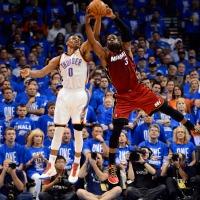BOB GARFIELD: This is On the Media, I’m Bob Garfield. The NBA Finals between the Miami Heat and the Oklahoma City Thunder are going on this week and next. The Heat and Thunder are singular because they have reached the Championship Series. But they’re also singular because – they’re not plural. And for copy editors, that presents a very serious challenge. If the Celtics were facing the Spurs, headline writing would be a snap. But, as Deadspin Editor Tom Scocca recently wrote, these Finals present a number agreement nightmare. Tom, welcome to the show.
TOM SCOCCA: Thanks for having me.
BOB GARFIELD: Tom, there was a time this was really not a problem. Teams were plural. [LAUGHS] The Phillies, the Mets, the Braves, the Falcons, the Rangers, and so forth, and it corresponded with American grammatical tradition.
TOM SCOCCA: What happened, I think, was that people wanted something that sounded a little different, a little fresh when the NBA was expanding in the late eighties, and so we ended up with the Miami Heat and the Orlando Magic. You know, and now the Thunder, as a newly-renamed franchise, decided to do the same kind of thing. The problem is that what makes these names sound fresh or exciting to the people who name them is that they actually don’t fit the grammar that we’re used to using in America, when we talk about sports.
BOB GARFIELD: They’re mass nouns.
TOM SCOCCA: Right, which means that they denote an uncountable quantity.
BOB GARFIELD: And because it can’t be broken down into its parts, it’s confusing, right, because teams, by definition, are a collection of individuals. It must be maddening to try to write around that.
TOM SCOCCA: So you can talk about who the most valuable Yankee is because the Yankees break up into – one Yankee after another. But these teams are an undifferentiated mass, and you can’t break off a piece of “the heat” and talk about it because one piece of heat is heat.
BOB GARFIELD: Who’s the most valuable Heat?
TOM SCOCCA: One peal of thunder, you know, one calorie of heat? I don’t know how you would do that.
BOB GARFIELD: But there is another grammatical tradition for plurals that figures into this. Tell me about it.
TOM SCOCCA: In Britain, there’s a longstanding habit of treating collective nouns, or these kind of mass nouns, as plurals. So in British English you would say, “The team are doing well,” and, therefore, in British English they don’t really care what they call their sports teams. And so, you have people say “Arsenal are the superior side in this match.”
BOB GARFIELD: But the problem is, as you observed [LAUGHS], if you use the British convention, you sound like a poncy–
TOM SCOCCA: Rock critic, yeah.
[BOB LAUGHS]
That’s a longstanding problem in writing or talking about rock music, because so many bands have these names that are singular to describe this collective unit that’s the band. And, you know, there’s a lot of Anglophilia in rock writing, and so there are people who will say things like, “Pavement are the most important band since Wire.”
BOB GARFIELD: [LAUGHS] And how does that make you feel [LAUGHING], when you run across – “Pavement are the greatest band since Wire?”
TOM SCOCCA: Despite the fact that I might agree with the sentiment, the skin crawls on the back of my neck. It’s just – it’s a, it’s a –
BOB GARFIELD: And you basically want to find the critic and just – just kind of slap him around, come on –
[OVERTALK]
TOM SCOCCA: Yeah, give him a wedgie or something.
BOB GARFIELD: You’ve got some examples illustrating the issue.
TOM SCOCCA: Right. Sports Illustrated pretty consistently embraces the British usage, so their headline would be, “Heat Have Experienced Motivation to Win It All.”
BOB GARFIELD: Poncy.
TOM SCOCCA: Yeah, extremely. “Have another crumpet, Sports Illustrated.”
[BOB LAUGHING]
Whereas, the hometown papers for these teams have just embraced the whole newspeak behind having a team that has a name like this, and they are singular. So in the Daily Oklahoman is, “The Thunder is the Team America Loves to Love, the Heat is the Team America Loves to See Lose.” You might hear, “If the Heat Loses a Game, Don’t Say the Heat Lacks the Will to Win.
Please don’t say “The heat lacks the will to win” ‘cause it sounds terrible. Say, “The Heat Lack the Will.” Sentence by sentence, it really depends on what you’re saying which – which sounds absurd.
BOB GARFIELD: So at Deadspin, you’re – you’re not sticking to a single rule. You’re giving everything the ear test.
TOM SCOCCA: Yeah, which means that we just have to keep thinking about this when we would probably rather stop.
BOB GARFIELD: Well, Godspeed, Tom Scocca, Godspeed.
TOM SCOCCA: Thank you very much.
BOB GARFIELD: Tom Scocca is the editor of Deadspin.

